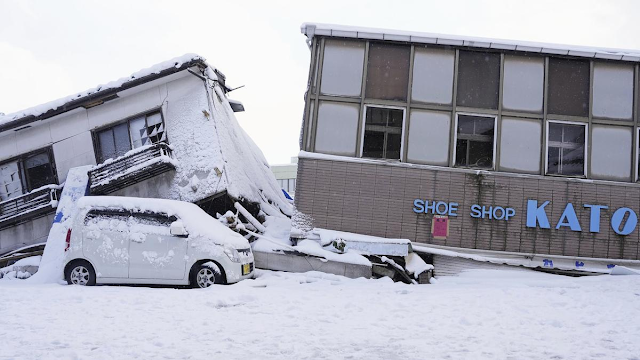Japan Struggles with Aftermath of Devastating Earthquake as Thousands Face Displacement and Stress
In the aftermath of a powerful earthquake that struck the western coast of Japan on New Year's Day, at least 161 lives have been lost, and numerous others are missing or injured, leaving thousands of people displaced and grappling with uncertainty.
The rescue efforts, mobilized since the magnitude 7.6 quake, have engaged thousands of troops, firefighters, and police who tirelessly search through collapsed structures, hoping to find survivors. The epicenter of the quakes was located on the Noto Peninsula in Ishikawa Prefecture, where authorities have issued warnings about the heightened risk of landslides, exacerbated by heavy snowfall in the region.
The devastation left in the quake's wake is evident in the landscape—a blanket of fluffy white snow covering dark, crumbled houses, ashen city blocks, and highways marred by holes and cracks.
The death toll includes 70 in Wajima, 70 in Suzu, 11 in Anamizu, and smaller numbers in four other towns. Additionally, 103 people remain unaccounted for, 565 are listed as injured, and 1,390 homes are reported destroyed or seriously damaged. The initial quake triggered a tsunami, compounding the destruction, and daily aftershocks continue to shake the region.
For the residents of Ishikawa, the challenges persist. Fisherman Shuji Yoshiura shared that the seabed upheaval caused by the quake prevents him from getting his boats out to sea. Wajima, once known for its vibrant shopping street and traditional crafts, now lies in ruins after fires ravaged the city.
Kentaro Mitsumori, who owns a grocery shop, faced looting concerns and decided to close his business due to an uncertain future with insufficient customers. The city's residents grapple with the aftermath in evacuation centers, where nearly 30,000 people stay, contending with cold floors and worries about infections amid the ongoing pandemic.
Despite initial challenges with aid distribution, some facilities are now able to provide hot food, bringing relief to those who have endured days of hardship. Temporary bathing facilities set up by soldiers offer a respite, but exhaustion and stress weigh heavily on survivors, many of whom are mourning the loss of loved ones during a time traditionally reserved for family gatherings.
Among the displaced is 79-year-old Mizue Kaba, who survived along with her daughter, son-in-law, and grandson. Sleeping at a school, she, like many others, faces uncertainty about what will happen when schools reopen after the New Year's break. While efforts to heat the shelters are underway, the challenges persist, leaving survivors in need of support amid the harsh conditions.



Comments
Post a Comment